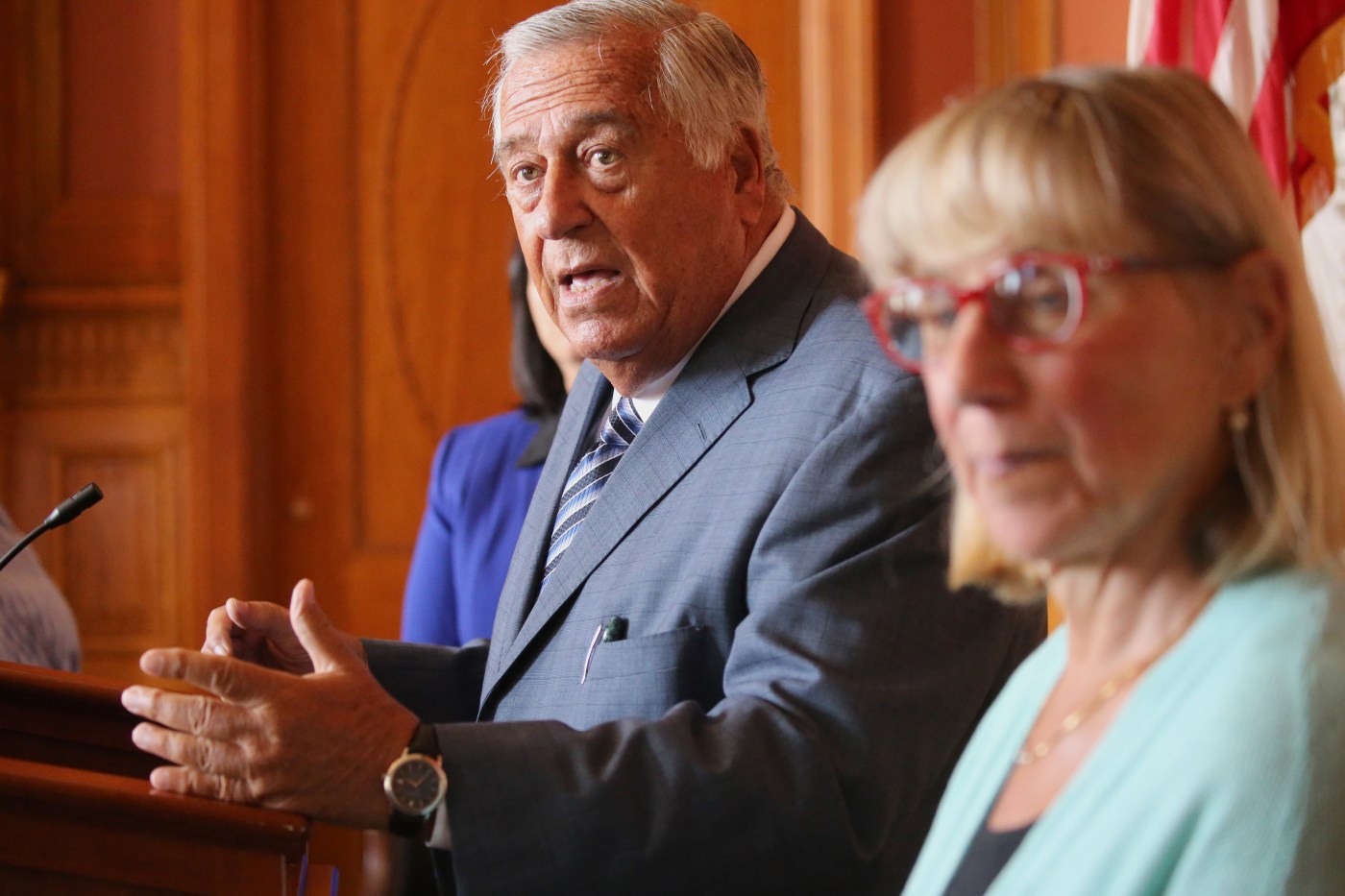
Pols & Politics: Beacon Hill faces calls for culture change after chaotic end of session
In the waning minutes of a seemingly never-ending legislative session Thursday morning, state Sen. John Keenan was clearly frustrated.
After more than 23 hours, the House and Senate had only advanced a handful of bills out of the roughly dozen major proposals that were on the table heading into the final formal meeting of the year.
The Democrat from Quincy openly acknowledged what many had been thinking for most of the week — the two branches of the Legislature appeared to have a hard time getting along and waited until the last minute to make a concerted push at passing complex policies.
“We talked yesterday and throughout tonight, and it’s the elephant in the room, we can’t get along. We can’t get along with the House. That’s part of it. And the (other) part of it is we just keep putting things off. We put them off,” he said around 9 a.m. Thursday morning.
In the days since the end of formal sessions, a growing chorus of people on Beacon Hill have expressed disappointment with lawmakers’ inability to produce compromises on highly watched bills that had shaped conversations at the State House for years.
The marathon end to formal lawmaking “wasn’t our finest hour,” said Rep. Todd Smola, a Warren Republican who is the top ranking minority member on the House’s powerful budget-writing committee.
“I think clearly, frustration is putting it mildly. And there’s not a member that at least I spoke to, and I spoke to quite a few in the last couple of days, that were pleased with how the process unfolded,” he said in an interview. “As a matter of fact, I think I spoke to more Democrats that were vocal about the frustration, the way the process unfolded.”
The exasperation with what has become an unbreakable cycle over the years of complicated bills stacking up during the final hours of formal sessions only to fall apart is prompting calls for legislative rules reform and culture changes.
Sen. Jamie Eldridge, a Marlborough Democrat, argued that lawmakers need to pass more bills during the first year of a two-year session and leaders in both branches must be willing to put legislation to a vote that does not have unanimous consensus.
“I think there is this very strange fear in an overwhelmingly Democratic Legislature that somehow, unless there is almost unanimous consensus on a bill that somehow it’s too uncomfortable for us to take up legislation and just take a vote where there could be some legislators, whether Democrats or Republicans, who are opposed,” he said in an interview.
Sen. Ryan Fattman, a Sutton Republican, said Beacon Hill pols need to take a look at their internal rules, including one that allows the Senate to meet past midnight on a two-thirds vote of the members.
Related Articles
Pols & Politics: Republican John Deaton finds friends in the Winklevoss twins
Pols & Politics: The summer of Democrats’ discontent with Biden is far from over
Pols & Politics: Gov. Healey walks political tightrope after gubernatorial huddle with Biden
Pols & Politics: Boston Mayor Wu makes moves; Frank Bellotti turns 101; fireworks show ready
Pols & Politics: As time runs out, meeting state budget deadline only a ‘point of pride’ for one top Democrat
He said the Senate should take a cue from the House, where meeting past midnight requires unanimous consent of the representatives present in the chamber.
“Nothing good comes of making laws at two, three, four in the morning. There’s no transparency, first of all, but like a human’s ability to read, reason, comprehend things after being awake for 23 hours, it becomes limited,” he said.
One former legislative staffer suggested Democratic leaders need to make a better effort of “sequencing legislation” so that priorities do not pile up right at the end of formal lawmaking for the year.
“They’re all kind of competing with each other for people’s time and attention, and you’ve got a really tight timeline. That’s just not a recipe for success,” said Massachusetts Taxpayers Foundation President Doug Howgate, who previously served on the Senate’s Ways and Means Committee. “The more major bills that stack up, the more likely it’s going to be that important pieces of legislation fall by the wayside.”
Irritation with the end of session crunch extends far outside the State House, where legislative failure has real-world impacts.
Greg Reibman, the head of the Charles River Regional Chamber of Commerce, said he was “infuriated” that an economic development bill with hundreds of millions of dollars for life sciences and climate technology initiatives was not put before the governor by deadline.
The borrowing bill could have provided big benefits for Watertown, Wellesley, Newton and Needham, the four towns the chamber represents that play host to companies involved in those industries, he said.
“Given all the other challenges we have — the housing challenges, the transportation challenges, the childcare challenges — we need the extra effort to make sure that we can continue to keep these companies here,” Reibman told the Herald.
Formal legislative business is supposed to end on July 31 in the second year of a session, but top Democrats signaled Friday that they are prepared to take the rare step of calling their members back to the State House to pass the economic development bill if an agreement can be reached between the House and Senate.
Some warn that could open up a whole host of issues.
“You call the membership back (and) you’re faced with a legislative question that a lot of people ask, ‘okay, if you could come back for this bill, why can’t you come back for this other important bill, or this other important bill?’” Smola said. “That’s a whole other door that gets opened with people, and then it frustrates the constituency that we represent.”
Even with a second life breathed into the economic development bill, the House and Senate will need to bridge divides that they could not cross during the normal course of their two-year session.
And with the relationships between the leaderships of the two branches at a low, optimism is not running high for a deal and many are asking for the Legislature to change how it operates.
Jonathan Cohn, the policy director at Progressive Massachusetts, said there is a “real downside” to having a permanent supermajority in both branches “that never feels the urgency of any issues.”
“For them to change, I think ultimately, some people will have to lose their seats because of it. I think that too often, the House and Senate operate like incumbent protection rackets,” he told the Herald.

